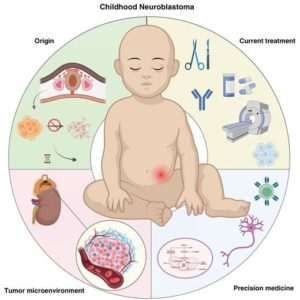
Neuroblastoma is a rare type of cancer that primarily affects children, especially those under the age of five. It develops from immature nerve cells found in several body areas, most commonly in and around the adrenal glands. As a parent, learning about this condition can help you confidently navigate your child’s diagnosis and treatment.
What is Neuroblastoma?
Neuroblastoma arises from neuroblasts, which are early forms of nerve cells in an embryo or fetus. Normally, neuroblasts mature into nerve cells or adrenal gland cells. However, in children with neuroblastoma, these cells grow uncontrollably, forming a tumor.
Signs and Symptoms of Neuroblastoma
The symptoms of neuroblastoma can vary depending on the location of the tumor. Common signs include:
- Abdominal swelling and pain
- A lump or mass in the abdomen, neck, or chest
- Loss of appetite and weight loss
- Bone pain or difficulty walking (if cancer spreads to the bones)
- Bruising around the eyes
- Fever and irritability
Causes and Risk Factors
The exact cause of neuroblastoma is unknown. However, genetic mutations during fetal development are believed to play a significant role. Risk factors include:
- Family history of neuroblastoma (though rare)
- Genetic syndromes that affect cell growth
Diagnosis and Staging
Diagnosing neuroblastoma typically involves several tests, such as:
- Imaging scans (MRI, CT, or MIBG scans)
- Urine and blood tests (to detect abnormal chemicals produced by neuroblastoma cells)
- Biopsy (removal of a small tissue sample for examination)
Staging helps determine the extent of cancer spread and guides treatment. Stages range from 1 (localized) to 4 (advanced with widespread spread).
Treatment Options for Neuroblastoma
Treatment depends on the child’s age, tumor location, and cancer stage. Common treatments include:
- Surgery: To remove the tumor, especially in localized cases.
- Chemotherapy: To shrink the tumor before surgery or eliminate remaining cancer cells.
- Radiation Therapy: Often used for advanced cases.
- Stem Cell Transplant: To replace damaged bone marrow after high-dose chemotherapy.
- Immunotherapy: Boosts the body’s immune system to fight cancer.
Coping and Support for Families
A neuroblastoma diagnosis can be overwhelming, but support is available. Join support groups, consult pediatric cancer specialists, and seek counseling for emotional well-being. Understanding your child’s treatment plan and maintaining open communication with healthcare providers can reduce anxiety.
Consulting a Specialist
In some cases, neuroblastoma can affect the urinary tract, necessitating expert care from a pediatric urologist. If you are in Thane, consult Dr. Apoorva Kulkarni, a renowned pediatric urologist in Thane, for specialized care and guidance.
Final Thoughts
Neuroblastoma is a challenging journey, but with early detection, proper treatment, and expert guidance, many children recover and lead healthy lives. Stay informed, seek timely medical help, and lean on a strong support network. For comprehensive pediatric urological care, reach out to Dr. Apoorva Kulkarni, a trusted pediatric urologist in Thane.
Neuroblastoma is a rare type of cancer that primarily affects children, especially those under the age of five. It develops from immature nerve cells found in several body areas, most commonly in and around the adrenal glands. As a parent, learning about this condition can help you confidently navigate your child’s diagnosis and treatment.
What is Neuroblastoma?
Neuroblastoma arises from neuroblasts, which are early forms of nerve cells in an embryo or fetus. Normally, neuroblasts mature into nerve cells or adrenal gland cells. However, in children with neuroblastoma, these cells grow uncontrollably, forming a tumor.
Signs and Symptoms of Neuroblastoma
The symptoms of neuroblastoma can vary depending on the location of the tumor. Common signs include:
- Abdominal swelling and pain
- A lump or mass in the abdomen, neck, or chest
- Loss of appetite and weight loss
- Bone pain or difficulty walking (if cancer spreads to the bones)
- Bruising around the eyes
- Fever and irritability
Causes and Risk Factors
The exact cause of neuroblastoma is unknown. However, genetic mutations during fetal development are believed to play a significant role. Risk factors include:
- Family history of neuroblastoma (though rare)
- Genetic syndromes that affect cell growth
Diagnosis and Staging
Diagnosing neuroblastoma typically involves several tests, such as:
- Imaging scans (MRI, CT, or MIBG scans)
- Urine and blood tests (to detect abnormal chemicals produced by neuroblastoma cells)
- Biopsy (removal of a small tissue sample for examination)
Staging helps determine the extent of cancer spread and guides treatment. Stages range from 1 (localized) to 4 (advanced with widespread spread).
Treatment Options for Neuroblastoma
Treatment depends on the child’s age, tumor location, and cancer stage. Common treatments include:
- Surgery: To remove the tumor, especially in localized cases.
- Chemotherapy: To shrink the tumor before surgery or eliminate remaining cancer cells.
- Radiation Therapy: Often used for advanced cases.
- Stem Cell Transplant: To replace damaged bone marrow after high-dose chemotherapy.
- Immunotherapy: Boosts the body’s immune system to fight cancer.
Coping and Support for Families
A neuroblastoma diagnosis can be overwhelming, but support is available. Join support groups, consult pediatric cancer specialists, and seek counseling for emotional well-being. Understanding your child’s treatment plan and maintaining open communication with healthcare providers can reduce anxiety.
Consulting a Specialist
In some cases, neuroblastoma can affect the urinary tract, necessitating expert care from a pediatric urologist. If you are in Thane, consult Dr. Apoorva Kulkarni, a renowned pediatric urologist in Thane, for specialized care and guidance.
Neuroblastoma is a challenging journey, but with early detection, proper treatment, and expert guidance, many children recover and lead healthy lives. Stay informed, seek timely medical help, and lean on a strong support network. For comprehensive pediatric urological care, reach out to Dr. Apoorva Kulkarni, a trusted pediatric urologist in Thane.
